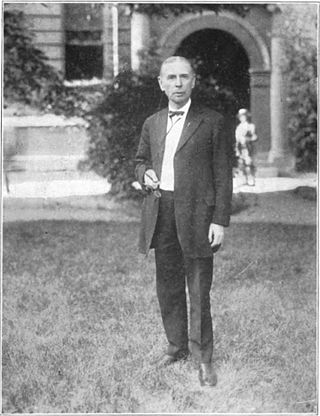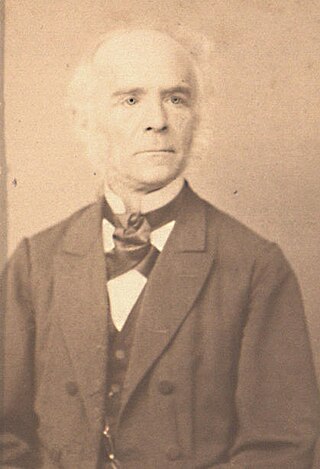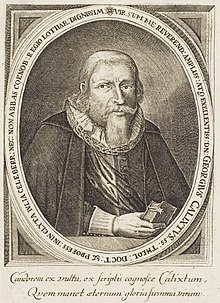
Ernst Ludwig Theodor Henke, was a German theologian and historian, and the son of the theologian Heinrich Henke (1752–1809). He was the father of anatomist Wilhelm von Henke (1834–1896).

Simon Episcopius was a Dutch theologian and Remonstrant who played a significant role at the Synod of Dort in 1618. His name is the Latinized form of his Dutch name Simon Bisschop.

Martin Chemnitz was an eminent second-generation German, Evangelical Lutheran, Christian theologian, and a Protestant reformer, churchman, and confessor. In the Evangelical Lutheran tradition he is known as Alter Martinus, the "Second Martin": Si Martinus non fuisset, Martinus vix stetisset goes a common saying concerning him. He is listed and remembered in the Calendar of Saints and Commemorations in the Liturgical Church Year as a pastor and confessor by both the Evangelical Lutheran Church in America and Lutheran Church–Missouri Synod.
The Apology of the Augsburg Confession was written by Philipp Melanchthon during and after the 1530 Diet of Augsburg as a response to the Pontifical Confutation of the Augsburg Confession, Charles V's commissioned official Roman Catholic response to the Lutheran Augsburg Confession of 25 June 1530. It was intended to be a defense of the Augsburg Confession and a refutation of the Confutation. It was signed as a confession of faith by leading Lutheran magnates and clergy at the meeting of the Smalkaldic League in February, 1537, and subsequently included in the German [1580] and Latin [1584] Book of Concord. As the longest document in the Book of Concord it offers the most detailed Lutheran response to the Roman Catholicism of that day as well as an extensive Lutheran exposition of the doctrine of Justification.

Christoph Ernst Luthardt, was a conservative German Lutheran theologian, Biblical commentator and Christian apologist. He was born in Maroldsweisach, Bavaria.

The University of Helmstedt was a university in Helmstedt in the Duchy of Brunswick-Wolfenbüttel that existed from 1576 until 1810.

Franz August Otto Pieper was a Confessional Lutheran theologian who also served as the fourth president of what was known at that time as the German Evangelical Lutheran Synod of Missouri, Ohio, and Other States.
David Caspari was a German Lutheran theologian. He was the father of Georg Caspari.

Andreas Gerhard Hyperius (1511–1564), real name Andreas Gheeraerdts, was a Protestant theologian and Protestant reformer. He was Flemish, born at Ypres, which is signified by the name 'Hyperius'.

Karl Graul was a leader of Leipzig Lutheran mission and a Tamil scholar. He was born in a poor weaver family in Germany. He moved to India as the director of the Lutheran Leipzig Mission in 1849 and there he mastered Tamil.

Wilhelm Gass was a German theologian born in Breslau. He was the son of theologian Joachim Christian Gass (1766–1831).
The syncretistic controversy was the theological debate focusing on efforts to unite Protestant churches in 17th Century Germany. It was started mainly by the efforts of Georg Calixt and his supporters to secure a basis on which Lutherans could have a good relationship with both the Reformed Church and the Roman Catholic Church. It lasted from 1640 to 1686.

Johann Melchior Goeze was a Lutheran pastor and theologian during the period of Late Orthodoxy. From 1760 to 1770 he served as senior of Hamburg presiding as spiritual leader over the Lutheran state church of the city-state.
The surname of Eifert, Eiffert, Eyfert, is German in origin. It has in its modern context in the translation of zealot, the biblical form, Pinhas the zealot. There is also an early Prussian translation that means "one who protects what is dear", and symbolized in art by a wall or castle engulfed in flames.
Johannes Wallmann was a German Protestant theologian and emeritus professor of church history at the Ruhr-Universität Bochum.

Christoph Pezel was an influential Reformed Theologian who introduced the Reformed confession to Nassau-Dillenburg and Bremen.

Johann Friedrich Mayer was a German Lutheran theologian and professor of theology at Wittenberg University. He was an important champion of Lutheran orthodoxy and General Superintendent of Swedish Pomerania.
Gustav Wilhelm Frank was a German-Austrian Protestant theologian, known as the author of a multi-volume work on the history of Protestant theology.
Wilhelm Germann was a German Protestant theologian and missionary.
Balthasar Cellarius as a German Lutheran theologian and preacher. He wrote prolifically. In 1642 he moved to the University of Helmstedt where became a professor in New Testament studies.













